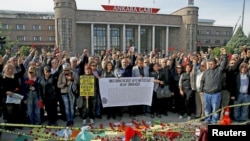Turkey's political divisions continue to deepen following the worst terrorist attack in the country's modern history. More than 100 people died in twin suicide bombings on October 10.
The Turkish president claims a conspiracy of conflicting groups were responsible for the attack, but opposition parties accuse his government of negligence, if not collusion in the bombings. The controversy comes in the midst of a general election campaign.
A Turkish state prosecutor has opened an investigation into Interior Minister Selami Altinok and several other senior state officials over the handling of the attack. All the main opposition parties have accused the government and security officials of negligence.
Soli Ozel, an International relations expert at Istanbul’s Kadir Has University, said the charges are a sign of how deeply divided Turkish society has become.
"The political discourse in this country has been such that everybody who opposes the government are deemed like enemies," said Ozel. "Obviously one wonders why the state did not take [the] necessary precautions and why there was such [a] big intelligence failure."
Government denials
The government strongly denies charges of negligence. It has continued to come under pressure following the revelation that one of the bombers belonged to an Islamic State cell in Turkey that had been under surveillance by Turkish intelligence.
President Recep Tayyip Erdogan has defended his Justice and Development Party, or AKP, and dismissed claims that Islamic State was solely behind the attack. He alleges the attack came out of a conspiracy among Syrian intelligence, the PKK Kurdish rebel group and the PKK's Syrian affiliate to destabilize his government ahead of elections on November 1. Opposition parties have dismissed Erdogan's allegation.
Sinan Ulgen, a visiting scholar at Carnegie Europe in Brussels, said the bombing will have little effect on the upcoming poll.
"Given the high degree of polarization in the country, it's very unlikely that we would see a large and significant shift in the vote. So only very small, at the margins, some changes may have happened, and certainly not in a way to effect the outcome of the elections in any big way," said Ulgen.
Prime Minister Ahmet Davutoglu claimed the AKP has received a boost in support since the bombing, though party spokesman Omer Celik said it has lost support.
Prior to Thursday’s embargo on public opinion polling ahead of the election, most polls showed no overall winner, meaning the country is facing the prospect of a coalition government. Observers say a coalition could offer the best chance to reverse the country's deepening polarization.




